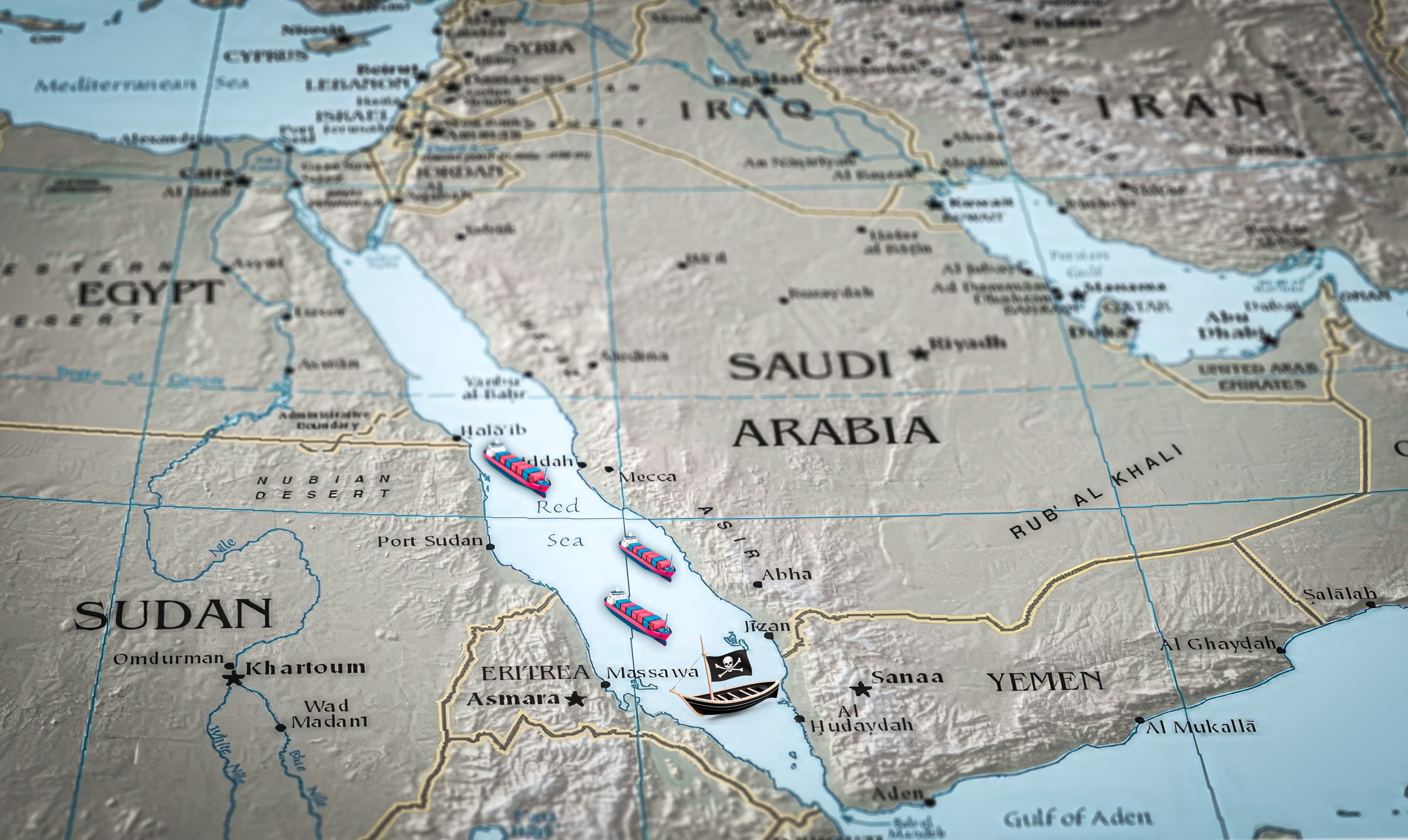
The Red Sea Crisis: Can Owners refuse to transit?
July 29th, 2024
The Red Sea Crisis: Can Owners refuse to transit?
Introduction
With no end to the Israeli-Palestinian conflict in sight and Houthi attacks on vessels becoming more indiscriminate, we take a look at whether shipowners can refuse to sail via the Red Sea and divert their vessels to other routes.
Houthis – who are they?
The Houthis are a Shi’a Islamist militant group in control of much of Northern Yemen and ruling over the majority of the Yemeni population. They came to prominence during the beginning of the Yemeni Civil War in 2014. They have received extensive backing from the Iranian government, including the provision of short-range ballistic missiles, military training, cyber operations and millions of dollars in finance. Unlike the Somalian pirate attacks that were hitherto the principal danger in the Red Sea/Gulf of Aden to merchant shipping, the Houthis are well equipped and their attacks are far-reaching.
Attacks on merchant shipping
On the 14 November 2023, Houthi leader Abdulmalik al-Houthi announced that the Houthis would begin targeting Israeli ships in the Red Sea and the Bab al-Mandeb Strait. Some 5 days later, the Houthis captured the Galaxy Leader, an Israeli owned and Japanese operated cargo ship in the Red Sea. The Houthis subsequently announced that they would expand their attacks to all vessels heading to Israel. Since then, their attacks have been indiscriminate and wide reaching. The Huang Pu, a Chinese owned tanker carrying Russian crude, was attacked on 13 March 2024; the MSC Veracruz was attacked in the Indian Ocean on 24 April; and the oil tanker Wind, carrying Russian crude to China, was attacked on 18 May 2024. More recently, the Houthis have claimed to attack three ships – the Yannis (Red Sea); the Essex (Mediterranean Sea); and MSC Alexandra (Arabian Sea).
Approach to assessing whether owners can refuse to transit the Red Sea
When it comes to determining whether owners can refuse to transit the Red Sea, the sensible place to start is to assess the terms of the charterparty. We would recommend that no term of the charterparty should be read in isolation – any clause should be construed alongside all other clauses of the charterparty, to indicate the objective intention of the parties. We take a look at some of the possible relevant provisions below.
Express provision to transit the Red Sea
The first step would be to assess whether there is a term in the charterparty which expressly calls for the vessel to transit the Red Sea. Where there is no express provision, it may be that the vessel is to transit the Red Sea by owners’ implied obligation to carry out the voyage with the “utmost dispatch” (i.e. the vessel to proceed via the shortage route - see The Hill Harmony [2001] 1 AC 638).
Notwithstanding an express or implied provision in the charterparty suggesting that the vessel must transit the Red Sea, owners may still have the liberty to deviate the vessel. Some charterparties contain an express right for the owner to deviate (see “War Risks Clause” below). In the absence of such an express provision, owners may be aided by the common law position, which provides that deviation can be justified where the master receives credible information that if he continues in the direct course of voyage, the vessel will be exposed to some “imminent peril, as from Pirates, or Icebergs, or other dangers of navigation” (see The Teutonia (1872) LR 4 PC 171). Additionally, if the Hague/Hague Visby Rules are incorporated into the charterparty, owners may also be able to rely on Article IV, Rule 4, which provides: “any deviation or attempting to save life or property at sea or any reasonable deviation shall not be deemed an infringement or breach of these rules of the contract of carriage, and the carrier shall not be liable for any loss or damage resulting therefrom”.
War Risks Clause
The second prudent step would be to assess whether the charterparty contains a war risks clause. These clauses can, in some instances, provide owners with valid grounds for refusing to sail through a particular area or destination. Not all standard forms contain such a clause (like the NYPE form), but it is common for parties to import a standard war risks clause as an additional term of the charterparty.
We focus on the most recent “off-the-shelf” war risks clauses provided by BIMCO for time charterparties –CONWARTIME 2013 (for time charterparties). Please see an extract below (emphasis added):
“(a) For the purpose of this Clause, the words:
“Owners” shall include shipowners, bareboat charterers, disponent owners, managers or other operators who are charged with the management of the Vessel, and the master; and
“War Risks” shall include any actual, threatened or reported:
War, act of war, civil war or hostilities; revolution; rebellion; civil commotion; warlike operations; laying of mines; acts of piracy and/or violent robbery and/or capture/seizure (hereinafter “Piracy”); acts of terrorists; acts of hostility or malicious damage; blockades (whether imposed against all vessels or imposed selectively against vessels of certain flags or ownership, or against certain cargoes or crews or otherwise howsoever), by any person, body, terrorist or political group, or the government of any state or territory whether recognised or not, which, in the reasonable judgement of the Master and/or the Owners, may be dangerous or may become dangerous to the Vessel, cargo, crew or other persons on board the Vessel.
(b) The Vessel shall not be obliged to proceed or required to continue to or through, any port, place, area, or zone, or any waterway or canal (hereinafter “Area”), where it appears that the Vessel, cargo, crew or other persons on board the Vessel, in the reasonable judgement of the Master and/or the Owners, may be exposed to War Risks whether such risk existed at the time of entering into this Charter Party or occurred thereafter. Should the Vessel be within any such place as aforesaid, which only becomes dangerous, or may become dangerous, after entry into it, the Vessel shall be at liberty to leave it.…”
Interpretation
To fully ascertain when and if a war risks clause can be called upon as justification to refuse to transit the Red Sea, it is necessary to fully understand the meaning of the following:
- “Reasonable judgement of the master”; and
- “May be exposed to War Risks”;
The Triton Lark [2012] 1 LLR 151 provides some explanation as to how the above listed phrases should be interpreted. In this case, the charterers had instructed the vessel to proceed from Hamburg to China via the Suez and the Gulf of Aden. Owners refused these orders, on account of the risk of piracy and proceeded to sail around the Cape of Good Hope. The question was whether owners could do so by relying on CONWARTIME 1993, an earlier version of CONWARTIME 2013 which is paraphrased above.
Mr Justice Teare held that for the judgement of the master to be “reasonable”, it must be made “in good faith” and “objectively reasonable”. A master will ensure that their judgement is “objectively reasonable” if they have made all “necessary enquiries”. This may include obtaining expert analysis and even legal advice.
As for the meaning of “may be exposed to War Risks”, J Teare held that “may be” is to be construed as meaning a “real likelihood”. It is not something based on speculation but can include an event which has less than an even chance of happening (though not a “bare possibility” of occurring).
For the interpretation of “exposed to War Risks”, J Teare determined that this is to be referring to situations which are “dangerous”. What is determined as dangerous will depend on the facts of the case. It will depend upon both the degree of likelihood that a particular peril might occur, and the gravity or otherwise of the consequences to the vessel, cargo and crew should that peril occur (see The Triton Lark [2012] 1 LLR 457).
Applying this to the previous principal threat in the Red Sea – piracy, it may be possible for owners to put measures in place to limit the dangerous nature of this threat. This could include stationing an armed guard on the vessel or transiting the Red Sea with a military convoy. However, Houthi attacks cannot be prevented so easily. There are few measures available to owners which can prevent a drone or missile attack. It may be that Houthi attacks are considered dangerous situations for the purposes of the phrase “exposed to war risks”.
Risk
It will be noted that CONWARTIME 2013 also contains the phrase - “Whether such risk existed at the time of entering the Charterparty or sometime thereafter”. This was an addition brought in by the introduction of CONWARTIME 2013, to provide certainty after the ruling in The Paiwan Wisdom [2012] LLR 416, which held that CONWARTIME 2004 did not contain a requirement that the relevant war risk had to have escalated since the date the parties entered the charterparty.
In The Paiwan Wisdom, owners relied on CONWARTIME 2004 to refuse to comply with charterers’ voyage orders to load a cargo of cement at Hoping, Taiwan, and discharge at Mombasa, Kenya. Owners referred to recent developments in the Indian Ocean in respect of piracy and to piracy extending further along the coast/waters of East Africa. The question for the Court was whether owners could rely on CONWARTIME 2004 when there was no material change in the risk of piracy between the date of the charterparty and the date of the order.
J Teare found that there were no terms in the charterparty that suggested that Owners had accepted the risk of piracy in trading to Mombasa, Kenya. He also held that CONWARTIME 2004 contained no requirement for the relevant war risk to have escalated since the date of the charterparty in order for owners to rely on the clause. Therefore, owners, in this case, could refuse to comply with charterers’ orders.
However, there will likely have to be a material change in risk for owners to rely on a war risks clause where the charterparty contains an undertaking to carry out that route and an express regime for dealing with that risk. In The Polar [2024] 1 LLR 85, it was held that where the charterparty contained a specifically agreed contractual regime concerning the risk of piracy in the Gulf of Aden and the route and terms of transit had been agreed, owners could not refuse to transit the Gulf of Aden by relying on the war risk clause in the charterparty.
Lord Hamblen stated that the war risk clause could only be relied upon if “different war risks materialised in the Gulf of Aden or there was a change in the nature of the piracy risk, or a change in its degree sufficient to make it qualitatively different.”
Applying this to Houthi attacks in the Red Sea, if there is a term in the charterparty which suggests owners have accounted for this risk, then there will likely need to be an escalation or change in the nature of the risk of Houthi attacks for owners to be able to rely on the war risks clause.
Can owners refuse to transit the Red Sea?
Whether owners can refuse to transit the Red Sea will depend on the terms of the charterparty. Owners may be assisted by the presence of a war risks clause like CONWARTIME 2013. However, this should be read alongside all other terms in the charterparty. Where the charterparty contains an express agreement to transit the Red Sea, owners will likely have to show that there has a been material change in the risk of a Houthi attack since the date they entered the charterparty.
Are you on board?
Get in touch